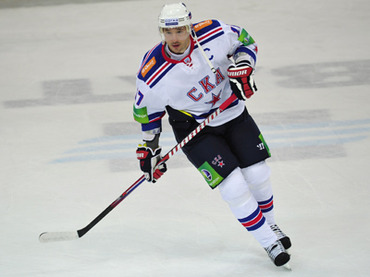When the NHL lockout began nearly two months ago, one of the first leagues that began recruiting the NHL’s top talent was the Kontinental Hockey League in Russia. Arguably the most talent-laden league outside of the NHL, the KHL saw an incredible influx of top-tired talent like Pavel Datsyuk, Ilya Kovalchuk, Evgeni Malkin and Alexander Ovechkin.
Despite this invasion of some of the world’s best players, guess who leads the league in scoring?
None other than former Nashville Predators forward Alexander Radulov, who is not an NHL defector after signing a four-year deal to play with CSKA in June.
Okay, so that’s a little misleading. Radulov does lead the league with an impressive 33 points, including 12 goals, in 24 games, but many of the NHL players currently playing in the KHL have played in fewer games. For instance, Evgeni Malkin currently sits third in the league with 28 points, but has played in five less games than Radulov.
If we take away face-value stats like goals and assists and instead look at points per game, which is the only way to really put these players on equal footing, Malkin’s 1.47 points per game average outpaces Radulov’s 1.38 average.
Still better is Ilya Kovalchuk, who has posted nine goals and 17 assists for 26 points in 17 games – good for a 1.53 points per game average. Taking goals into account with the same formula and Kovalchuk still outdoes both players with .53 goals per game. That average is slightly better than Radulov, who is averaging .5 goals per game. Malkin has the worst of the three with .42 goals per game.
Detroit Red Wings forward Pavel Datsyuk, who is playing for CSKA during the lockout, is putting up good numbers compared to last year in the NHL. His 19 points in 16 games is good enough for a 1.19 points per game average, which is higher than the .96 average he put up last season in the NHL. Similarly, Datsyuk’s .32 goals per game average is slightly higher than his .27 average from last season. And Datsyuk has already scored some highlight-reel goals during his time overseas as well.
It could be argued that the increases in Datsyuk’s averages could be a result of playing against weaker defenses or against overall weaker competition. If that’s the case, it’s interesting to consider NHL phenom Alexander Ovechkin’s numbers.
There has been a lot of talk the last few seasons as Ovechkin has declined from the 60-goal, 100+ point scorer in 2007-08 to a 38 goal, 65 point producer last season. Over the span of a couple years, Ovechkin’s production has nearly dropped in half. Granted, his 38 goals were still good for fifth in the league in goals scored last season, but that’s still a significant decline in points production for someone just entering the prime of his career.
In 15 games with the KHL, Ovechkin kept up a point per game pace. His six goals have him averaging .4 goals per game, which is a less than the .49 pace he averaged last season. In all fairness, it’s only a handful of games into the season for Ovechkin, but one still has to wonder about the slight drop in production. If Datsyuk’s increase in scoring is due to lesser competition, shouldn’t Ovechkin have benefited from the same increase in his numbers? It begs a longer discussion about what fans can expect from Ovechkin when or if he returns to the NHL – or even if his production overseas can serve as a strong indicator of where his game is at.
While many of these players have played in the KHL before, there is still an adjustment period to them going back to the league. Bigger rink, different style of play and new line mates to adjust to are just a few conditions that these players have to deal with.
Still, it’s hard to ignore the impact that these NHL players have already had. Malkin and Kovalchuk are third and fourth in the league in scoring so far, and each has played fewer games than any of the other top five scorers. But it’s Ovechkin’s Dynamo Msk team who currently occupies the top spot in the league with 53 points.


